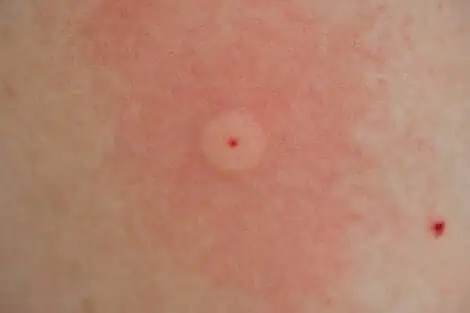An Asian wasp sting is severe in only a small percentage of cases. However, it is a troublesome episode that causes severe symptoms. The danger is that the person stung develops an allergic reaction.
An Asian wasp sting is an episode that must be handled with care. In most cases, it does not generate serious consequences, but in others, it can even lead to death. The bite of this insect has already been the cause of some recorded deaths.
The Asian wasp was first detected in Europe in 2004. It is so-called because it comes from Southeast Asia, but it is also known as the Asian hornet or black wasp due to its color. From French lands, it spread to other countries of the continent and arrived in Italy in 2013, especially in Liguria and in upper Tuscany.
The bite of an Asian wasp inoculates more venom than that of a classic wasp. The consequences depend on the person targeted; if you are allergic to these insects, the situation can be serious.
The sting of the Asian wasp
Importantly, the sting of the Asian wasp causes death in only 0.08% of cases. It is therefore a very low index. Even so, a more painful reaction occurs in all people who are stung by this species than that caused by a common wasp. This is because it is larger and contains more poison.
Also Read: Almond milk: all its benefits
The Asian wasp, whose scientific name is Asian hornet, is an insect that can reach 3.5 cm. Its main characteristics are its large size and the black color of the body, which distinguishes it from European wasps. Unlike bees, these wasps can sting the same person multiple times.
The main risk of an Asian wasp sting is that of triggering an allergic reaction of the immune system. In most cases, it is not possible to know in advance whether this reaction will occur, as there is no evidence to detect such an allergy.
Effects of the sting of the Asian hornet
The first symptom of an Asian wasp sting is intense pain, like a very large pinprick. Its strong sting causes pain similar to that produced by a burn. Later, a large area of the skin becomes inflamed and the pain persists for an average of 24 hours.
One of the risks is that these insects tend to attack sensitive areas such as the mucous membranes of the mouth, eyes, or nose. Keep in mind that Asian wasps release a pheromone via their sting, attracting the rest of the hive to attack.
If an allergic reaction is triggered, the risk of anaphylaxis persists between 30 and 60 minutes after the Asian wasp sting. This reaction has four degrees:
- I: generalized urticaria, itching, swelling, and discomfort.
- II: inflammation of the mucous membranes, the feeling of tightness in the chest, abdominal pain, nausea, vomiting, diarrhea, and dizziness.
- III: difficulty in breathing, swallowing, and making sounds. Confusion and a feeling of death.
- IV: all previous symptoms, plus hypotension, collapse, incontinence, bluish skin, and loss of consciousness.
How to calm the symptoms of an Asian wasp sting
The Asian wasps only attack if they feel threatened. First of all, therefore, it is advisable not to approach the crawl spaces nor to try to kill or attack them if they fly around us. It is important to be careful when exploring bushes or places where wood accumulates. On the other hand, prevention is better than cure.
Read Also: Warm-up exercises to do at home
If you have been stung by an Asian hornet, you need to apply something cold to the affected area immediately. This will help calm the inflammation and pain. You can also apply vinegar packs to achieve the same effects. If the pain is intense, it is recommended to apply a corticosteroid cream and take oral antihistamines and, if necessary, oral corticosteroids.
Allergic reaction is a medical emergency that must be addressed as soon as possible. If the person has a history of this type, they should go to the hospital as soon as possible. You should go to the nearest emergency room immediately even if you experience an immediate allergic-type reaction. Only 3% of people are allergic, but until symptoms show, you don’t know if you are part of this small percentage.

















